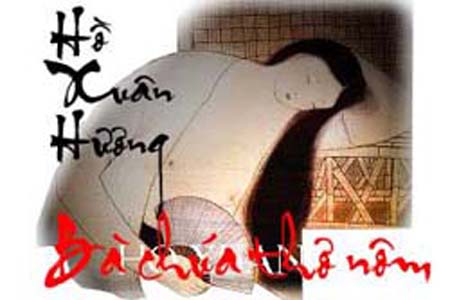For Ho Xuan Huong poetic contests are not futile rhetorical exercises. In those times, literature was a source of social prestige, the prerogative of men who were allowed to sit for the triennial competitions to become mandarins. An old saying ranks social categories in this order of precedence: scholar, peasant, craftsman, tradesman.
A forerunner of feminism, Ho Xuan Huong made a point of beating the scholars with their own weapons.
With what irony she laughs at those who scrawl on the walls of the temples in the hope of being read, or, perhaps, of being immortalized by some occasional verses.

It is said that one day, journeying in the Province of Ninh Binh, she saw in front of the Pagoda of Dich Long, scholar’s cailigraphing a quatrain on the wall. She immediately invited them to compose poems with her: she proposed ’the bell” as the subject-matter and; as rhyme, the very difficult ’uong’. The pedants forfeited the game, while Ho Xuan Huong made these extemporaneous verses:
Stammerers, in group, gazing at a bell,
Spoke to each other: ‘Well, it a (b)ell.
(A play on words: ‘chuong’ (bell) is pronounced “uong” by stammerers).
Anecdotes of this kind are often told.
Ho Xuan Huong, seeing rather bad verse written on the white-washed wall of a pagoda, immediately composed a quatrain in answer:
They arrived at the temple, holding hands.
Unable to speak clearly, they pretended to compose verses.
Let those who see them, tell those incompetent versifiers
If they wish to survive, take white wash and give these walls back their purity.
Is there in the case of lime a sign of exorcism, as Maurice Durand thinks, or only an ironical threat?
Ho Xuan Huong is not kind to these good-for-nothings who think they are quite something.
Where are they going, these groups of simpletons?
Come here and let me, your elder sister, teach you versification.
Before this ironical tone of hers, how can we omit to call to mind the popular story of these versifiers making extemporaneous verses about the toad. The absurdity of the verses is matched only by the self-conceit of those who have made them.

